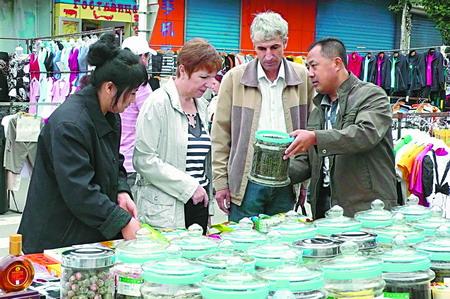
Russian customers checking Chinese tea products at an open market in Heihe, Heilongjiang province. [Qiu Qilong / For China Daily]
BEIJING - Notwithstanding the economic uncertainties in the coming months, Sino-Russian trade is expected to grow rapidly with bilateral trade volumes expected to touch $55 billion this year, a Russian trade official said on Tuesday.
The robust trend in exports during the first-half of the year is expected to continue in the second half also, and China may see a trade surplus with Russia, said Sergey Tsyplakov, trade representative of the Russian Federation in China.
Sino-Russian trade began to pick up this year after a lull last year due to the global financial crisis. During the first half of this year, bilateral trade volumes surged by 51.6 percent to $25.7 billion. China exported goods worth $11.8 billion to Russia, while the nation's imports stood at $13.9 billion.
Russia's emergence from the financial crisis and China's high economic growth are positive factors for trade growth in the second half. However, trade volumes will not be much higher than the first half and the figures for the whole year may be around $54 to $55 billion, compared with $56.8 billion in 2008, said Tsyplakov.
But, there are still many uncertainties that may impact the trade, such as China's economic slowdown, he said.
China's gross domestic product (GDP) increased by 10.3 percent year-on-year in the second quarter, slower than the 11.9 percent growth in the first quarter, but still the fastest growth worldwide.
Between January to June, China's exports to Russia increased by 59 percent over the same period in 2009. Prominent among the export goods were textiles, chemicals and industrial goods. The growth accelerated during the second quarter, with exports surging by 91 and 84 percent in May and June.
"While demand from Russia for Chinese goods continues to increase, the high growth (for China's exports to Russia) pace will remain for some time, but will not exceed 80 to 90 percent," said Tsyplakov.
With most of the developed markets like the United States and European Union plagued by the economic slowdown and high unemployment, China has shifted its focus to emerging markets to boost exports. In June, exports to Russia and Brazil grew by 84 and 125 percent respectively, while exports to the US and EU surged by only 40 percent.
During the first half, Russian GDP grew by 4.2 percent year-on-year, and expectations are that the annual growth target will be revised from the earlier forecast 4 percent.
"In the second half, China's exports to Russia will outperform imports in terms of value and growth," said Tsyplakov.
Though anti-dumping cases between the two nations here increased, such measures will not have any short-term impact on bilateral trade, said Tsyplakov. "At the same time both the nations should be cautious in initiating such cases."





